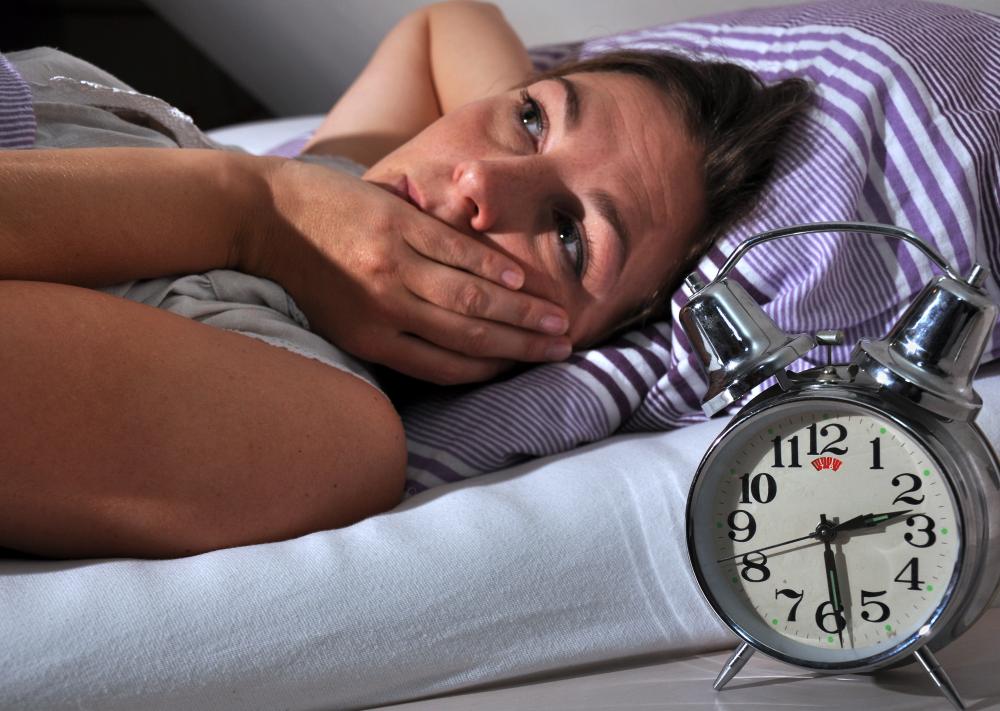At WiseGEEK, we're committed to delivering accurate, trustworthy information. Our expert-authored content is rigorously fact-checked and sourced from credible authorities. Discover how we uphold the highest standards in providing you with reliable knowledge.
What is Generalized Anxiety Disorder?
Generalized anxiety disorder (GAD) is a psychological condition which belongs to the family of anxiety disorders, psychological disorders characterized by having anxiety as a key feature. People can develop generalized anxiety disorder at any age, with the condition being about twice as common in women as in men. There are a number of treatments which can be used to address this condition, depending on the specifics of the patient, and there is no reason to suffer from GAD without treatment.
People with generalized anxiety disorder experience constant feelings of worry and anxiety which do not necessarily center around a particular thing. They may feel like they have to be constantly prepared for disaster or catastrophe, stressing out about everything from money to social situations. Some people develop panic attacks and other signs of severe stress, and these in turns may be a cause of anxiety, as the patient may feel uncomfortable in public because he or she is worried about developing a panic attack.

In addition to anxiety, the patient may also develop fatigue, insomnia, restlessness, impatience, headaches, nausea, vomiting, excessive sweating, and irritability. For some patients, the level of anxiety may be relatively low, but in others, generalized anxiety disorder causes a disruptive level of anxiety, making it difficult for the patient to live a normal, active life. If this persists for more than six months, the patient requires treatment. A diagnosis can be provided by a psychiatrist, who can offer some treatment options to the patient.

Several types of medication can assist with generalized anxiety disorder, including anti-anxiety drugs which can be used to manage the anxiety and related symptoms, along with antidepressants, which may help the patient achieve a more balanced mental state. It is believed that GAD originates in the brain, in the form of problems with neurotransmitters and the balance of chemicals in the brain, and the use of medications can help restore a more normal level of these chemicals to make the patient feel more comfortable.

Psychotherapy can also help with generalized anxiety disorder. Sessions with a therapist may be able to help a patient get at the root cause of the anxiety, and to address specific situations and issues, such as the desire to be able to go out and socialize with friends. Psychotherapy can be used as an alternative or supplement to medication, depending on the patient and the treatment approach of the patient's psychiatrist.
AS FEATURED ON:
AS FEATURED ON:


















Discussion Comments
From my personal experience, vitamin and mineral supplements help a lot with GAD. People with anxiety usually have magnesium and vitamin B12 deficiencies. I take these regularly for this reason.
@turkay1-- I'm not a doctor but I don't think that generalized anxiety disorder is permanent. It's true that some of us have a chemical imbalance in our brain where we don't have enough serotonin. This leads to generalized anxiety disorder symptoms and depression.
But at the same time, there is always an environmental trigger that's causing this problem in us. It might be a stressful job, a problematic family life or a health condition. I think that generalized anxiety disorder can be treated by avoiding the environmental factors that trigger it.
Medications are there to help us when we're in our worst stage. Because someone who has severe anxiety cannot think logically and change their life.
I've just been diagnosed with generalized anxiety disorder. I have been suffering from anxiety attacks for some time now. My doctor put me on anti-anxiety medications and I'm feeling better already. I'm just worried that I will rely on medication for the rest of my life.
Is general anxiety usually a permanent disorder? Can I get better in time?
Post your comments